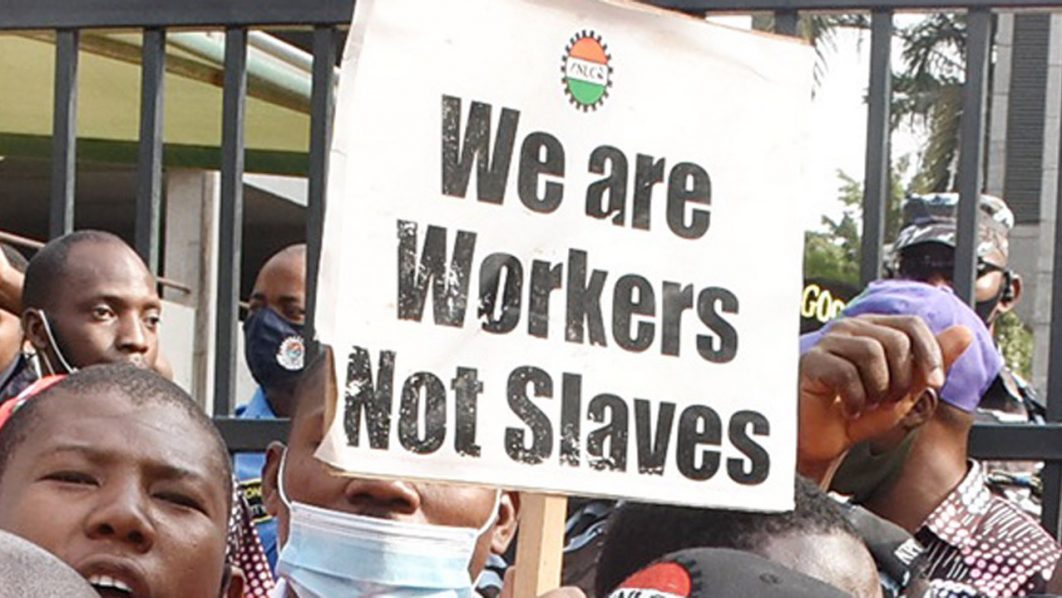
As Nigeria joined the global community to commemorate 2023 World Day for Decent Work (WDDW), workers have raised the alarm over unfair labour practices and injustice in workplaces.
[ad
They argued that the labour laws, which have been in the process of review since 2004, do not protect the worker, alleging that many employers deliberately violate the nation’s labour laws.
National President of the Association of Senior Staff of Banks, Insurance and Financial Institutions (ASSBIFI), Olusoji Oluwole, at the celebration organised by the union to mark the day, alleged that most labour officers and inspectors are constrained by a lack of appropriate legislation to curtail the excesses of recalcitrant employers and managements.
According to him, labour officers and inspectors are sparingly noticed in the workplace, even to investigate complaints or for interventions.
To this end, he urged the Federal Government to use its powers under the exclusive legislative list to ensure that deliberate violations of minimum conditions of employment by states, corporate and multinational organisations are stopped.
“Let me also challenge the government to review S. 12(4) of the Trade Unions Act, Cap T14, LFN, 2004. This section of the Act has been negatively and wrongly exploited by many unscrupulous employers and managements against the democratic spirit with which government enacted it,” he said.
With this year’s theme, ‘Pay Rise: A Necessity for Decent Standard of Living,’ Oluwole, said it focuses on building workers’ power by providing them living minimum wages and a decent standard of living.
Emphasising that a decent standard of living could not have come at a better time in Nigeria, Oluwole noted that decent pay in Nigeria was achievable if the government was committed and willing to checkmate corrupt practices and reduce the cost of governance.
Lamenting that the recent removal of fuel subsidy and the devaluation of the Naira had reduced the value of workers’ pay, he said the cost of living had gone beyond the reach of workers.
To address this, the ASSBIFI chief maintained that an adequate pay rise would put more money in the pockets of workers and boost his purchasing power.
According to him, decent work helps to increase productivity, improves access to financial services, reduces unemployment and stimulates socio-economic activities.
He submitted that a pay rise for workers at a time like this was essential to develop an economy that aims to sustain most of the citizenry.
“When we celebrate decent work, we demand fair income, social security, gender equality, employment opportunities for the teeming Nigerian youth, right to organise and freely bargain, end to corruption in high places and an end to a system that portends to jeopardise the future of the Nigerian nation.
“The celebration of the World Day for Decent Work rekindles our hope that someday wage justice, workplace rights and privileges, freedom to associate and freely bargain will become a commonly accepted standard in the Nigerian workplace,” he said.
The guest speaker and General Manager, Advanced Management School, Lagos, Bayo Owolabi, said to achieve a pay rise, there is a need for collective mobilisation of power resources like association, institutional, societal and structural power.
He said the workers’ movement should develop a cost of living evidence to underpin their claims, showcase the benefits of a pay rise and develop the institutional power of unions to ensure constructive social dialogue and negotiation that allows for public wage adjustment, among others.
According to him: “No decent work without decent wages, evidence abounds that pay rise impact productivity, productivity translates to higher business earnings, workers’ wages and more funding for social and developmental endeavours, while investment in social and development areas, such as education, healthcare, housing, among others would lead to a higher standard of living.”






